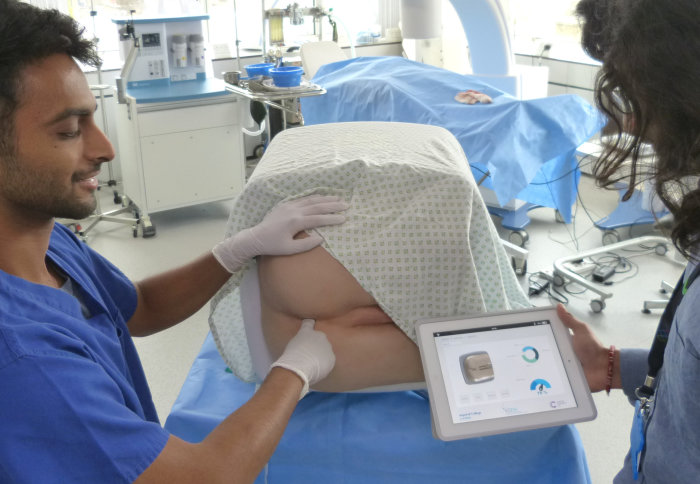Funding boost for Imperial researchers aiming to stop bowel cancer
by Ryan O'Hare

Simulation tool will help doctors spot colorectal cancer
Imperial researchers have been awarded funding to develop new methods to tackle bowel cancer at an early stage.
The funding, from Cancer Research UK, has been awarded to a project which aims to improve the diagnosis of early stage bowel cancer – also referred to as colorectal cancer – by developing realistic simulations for training clinicians.
Bowel cancer is the second most common cause of cancer death in the UK, with more than half of cases linked to major lifestyle and other risk factors, such as eating red meat, being overweight, being inactive, drinking alcohol and smoking.
As part of the project, a team led by Fernando Bello and Luc Marechal from the Imperial College Centre for Engagement and Simulation Science, will collaborate with Consultant Colorectal Surgeons Christos Kontovounisios and Professor Paris Tekkis from the Department of Surgery & Cancer.
We hope that through the development of new clinical simulation tools, our work will help medical practitioners to detect cancers at an earlier stage.” Dr Fernando Bello
Dr Bello, from the Department of Surgery & Cancer, has previously worked on a realistic model for surgical simulation, including a ‘robotic rectum’ – a prosthetic model for training clinicians to deliver prostate examinations which could help them to detect cancers in the clinic.
Now the group will look to improve on the existing benchtop training model - which will combine 3D imaging and virtual reality visualisations.
According to the team, the simulations will enable clinicians to simulate examination of patients with healthy and abnormal tissue, as well as early stage cancers. They explain that the simulations could ultimately help clinicians to identify and treat bowel cancers at an earlier stage, improving patient outcomes.
Commenting on the award Dr Bello said: “We are delighted to have received this funding from CRUK, which is one of the first awards for this type. Simulation is an important part of the training process for new doctors, as well as for improving the existing skills of practicing clinicians. We hope that through the development of new clinical simulation tools, our work will help medical practitioners to detect cancers at an earlier stage.”
Mr Christos Kontovounisios, a consultant surgeon at Chelsea and Westminster Hospital, added: “By providing realistic training in a simulated environment, we will be arming surgeons with the knowledge and skills they need to identify and more effectively treat colorectal cancers, which kills 16,000 people a year in the UK alone.”
Dr David Crosby, head of early detection research at Cancer Research UK, said: “The evidence is clear, when it comes to bowel cancer, the earlier we can detect and diagnose it, the more lives we can save. We’re very excited to be funding this project at Imperial, with such a clear path to patient impact. Innovative projects like these are part of Cancer Research UK’s plans to prioritise and boost funding into early cancer detection research.”
Article supporters
Article text (excluding photos or graphics) © Imperial College London.
Photos and graphics subject to third party copyright used with permission or © Imperial College London.
Reporter
Ryan O'Hare
Communications Division